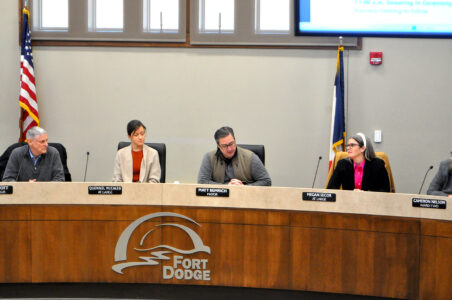Hinners acquitted of murder, guilty of manslaughter
He fatally shot his brother in April 2022
- Michael Hinners

Michael Hinners
ROCKWELL CITY — A Pomeroy man who admitted to shooting his brother in the chest with a shotgun last year has been acquitted of the charge of first-degree murder, however, a district court judge is still holding him accountable by finding him guilty of involuntary manslaughter, a Class D felony.
Michael Kenneth Hinners, 59, was arrested April 9, 2022, after fatally shooting his brother, Anthony Hinners, in front of Michael Hinners’ home in Pomeroy. Michael Hinners, who evidence showed was heavily intoxicated, admitted to shooting Anthony, but said it was a drunken accident.
Michael Hinners was arrested and charged with first-degree murder immediately following the shooting. A bench trial in front of District Court Judge Derek Johnson was held May 10-12. On Thursday afternoon, Johnson issued his ruling, finding the defendant not guilty of first-degree murder and the lesser included charges of second-degree murder and voluntary manslaughter. Instead, Johnson convicted Michael HInners of involuntary manslaughter.
“We agree with the court’s finding that the shooting was accidental, however continue to believe in Mike’s innocence as this was truly a tragic accident,” defense attorney Shannon Archer told The Messenger. “Nevertheless, we respect the court’s ruling.”
Calhoun County Attorney Tina Meth Farrington said the prosecution is now focused on the upcoming sentencing hearing.
“We respectfully disagree with the judge, but we will abide by this decision because that’s how our system is set up,” she said. “We will see what sentencing brings, because we will have some tools in our belt that we can pull out at sentencing.”
During Thursday’s verdict hearing, Johnson read the facts of the case and explained his reasonings for the verdict.
On April 9, 2022, the Hinners brothers had spent the day hunting and consuming alcohol before returning to Michael Hinners’ home at 201 S. Ontario in Pomeroy.
“Both brothers were heavily intoxicated,” Johnson said.
The brothers began arguing over a dead battery in Anthony Hinners’ car in the driveway. The defendant asked neighbor Ray Chick for help and Chick brought over a battery charger, but the brothers continued arguing when Michael told Anthony to move the car so the cord of the charger could reach the vehicle.
“Anthony responded by calling the defendant an ‘idiot’ and explained that the car would not start,” Johnson said.
Chick returned to his home to retrieve an extension cord and as he returned, he heard a gunshot and “all hell broke loose,” Chick testified during the May trial.
Chick testified that he didn’t actually see the gun or see the defendant shoot the victim, but he did see a “puff of smoke” come from the front door of the home and then Anthony Hinners “dropped like a rock” where he was standing at the bottom of the steps leading to the home’s front door.
Michael Hinners then told him to call for help because he had accidentally shot his brother, Chick testified. He also testified that on the day of the shooting, Michael Hinners had been “as drunk as he’s ever seen him.”
During trial, Pomeroy Police Chief Lori Gerdes, who was the first officer on scene after the shooting, testified that Michael Hinners kept saying, “Get him alive. Get him alive. Where’s the ambulance?”
In his ruling, Johnson noted that “if there is reasonable doubt as to the degree of crime, the defendant shall only be convicted of the degree for which there is no reasonable doubt.” The question, he said, was whether the shooting was intentional or accidental, or more specifically, “did the evidence establish proof beyond a reasonable doubt that the shooting was not accidental.”
In order to find Michael Hinners guilty of first-degree murder, the state had to prove beyond a reasonable doubt that the defendant shot Anthony Hinners; Anthony Hinners died as a result of being shot; the defendant acted with malice aforethought; and the defendant acted willfully, deliberately, premeditatedly and with specific intent to kill Anthony Hinners.
Johnson said that while Michael intentionally pointed the shotgun at Anthony, that may have been the extent of Michael’s intent with that action. He noted that the defendant did not try to flee the scene, immediately demanded the witness call 911 and showed he was upset and concerned about his brother receiving medical attention.
“The court simply cannot ignore the defendant’s immediate response and reaction to the shooting,” Johnson said. “The defendant’s response to the shooting was consistent with someone who was responsible for the accidental shooting of a loved one.”
Johnson said he’s not convinced beyond a reasonable doubt that Michael Hinners had intended to fatally shoot his brother, so he found the defendant not guilty of first-degree murder, as well as the lesser included charges of second-degree murder and voluntary manslaughter.
In finding Michael Hinners guilty of involuntary manslaughter, Johnson said that the defendant “recklessly committed a public offense” — pointing a firearm at another person — and that while committing that offense, he unintentionally caused the death of Anthony Hinners.
Michael Hinners’ may not have intended to end his brother’s life, Johnson said, but he did act “consciously” with “willful disregard of the consequences.”
“The defendant frequently used firearms and should be well aware that an intoxicated person pointing a gun at another individual constitutes a dangerous and lethal combination and that resulting harm is reasonably foreseeable,” he said.
A sentencing hearing is scheduled for July 21.
A Class D felony is punishable by up to five years in prison, though the sentence can be deferred or suspended.




